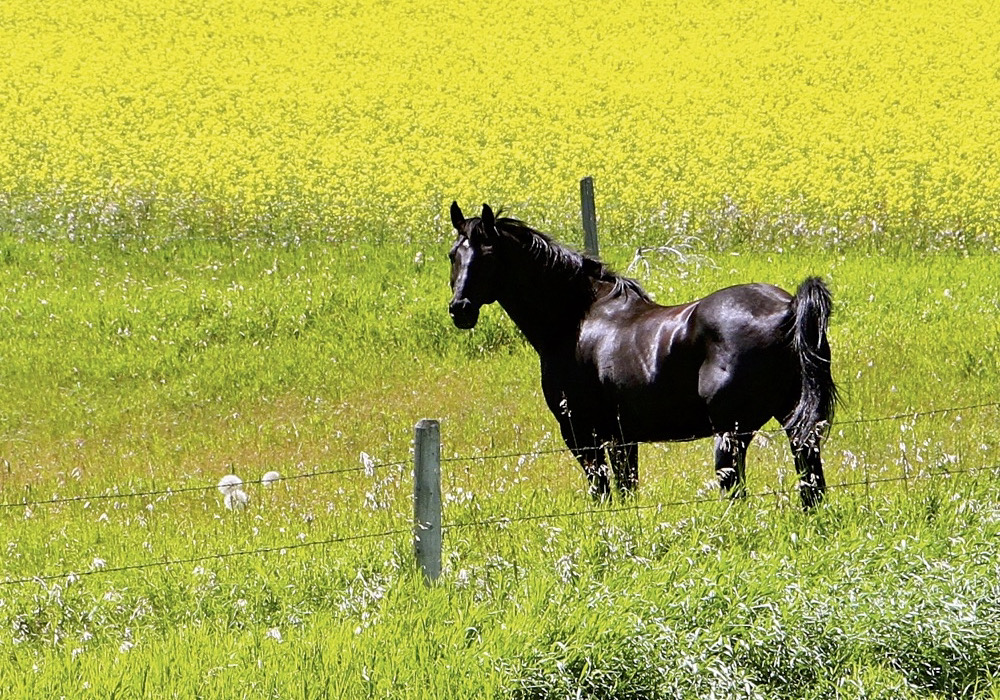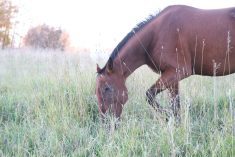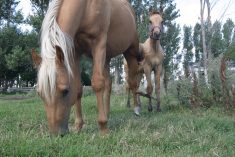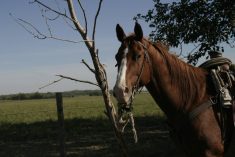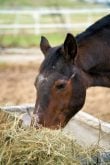There is an increased occurrence of the itchy horse during spring and summer associated with seasonal allergies.
While there are no published data on the number of allergies in horses, it would appear numbers are rising and parallel similar findings in humans and dogs.
The most obvious symptom of a seasonal allergy is itchiness. A horse with itchy skin will rub against fences, stalls, trees or just about any object. Animals with severe itch may become increasingly aggressive in search of relief to the point of abrading the skin raw and even creating open, weepy and crusty wounds. Chronically reactive skin can lead to hair loss, skin thickening and scar tissue.
Read Also
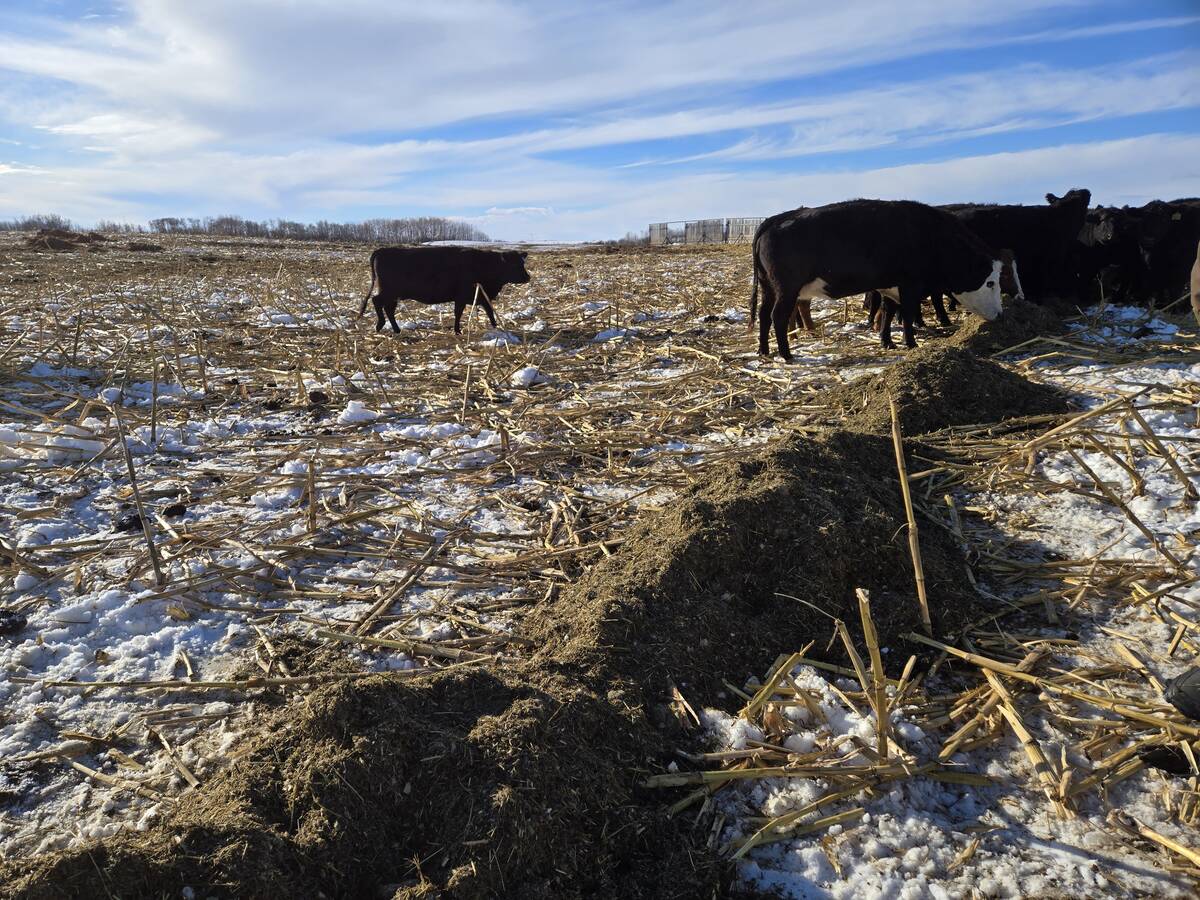
Winter grazing tour highlights cost-saving mix of cover crops and silage
Discover one beef producer’s strategies to slash winter feed costs — and how to make sure it meets a cattle’s nutritional needs.
Horses bothered by constant itching can become highly irritable, fatigued and even develop gastric ulcers. This behaviour in combination with the difficulty of identifying specific triggers can be frustrating.
Allergic reactions occur in response to an allergenic trigger. The job of the immune system is to identify foreign harmful substances and disarm them. However, when the immune system is ‘hypersensitive,’ it tends to tag ‘per se’ harmless agents of the environment as a threat and reacts out of proportion.
The reactions are complex and involve many factors. Symptoms can appear minutes, hours or as much as two days after exposure to a trigger.
Allergic reactions involve the release of a cascade of inflammatory chemicals, one of which is histamine. It works upon the nerves under the skin to produce itching and is the body’s attempt to cope with exposure to an allergen.
Often the itch is accompanied by hives (little raised swellings and/or bumps). Hives can multiply and become so numerous that they gather together, causing welts to appear. They may develop on any part of the body and in most cases disappear as rapidly as they arise, often within a few hours. They are seldom harmful to the horse.
Antihistamines and/or corticosteroids may help keep a horse comfortable until the signs subside. Corticosteroids can be the quickest way to reduce the inflammatory response yet would not be ideal for long-term use.
Although horses can undergo skin testing for specific allergens, determination is generally a combination of detective work, a detailed history and common sense.
The saliva of biting insects is by far the most common cause. Many of these biting insects are difficult to see with the naked eye. The most severe form of insect hypersensitivity is a reaction to the tiny biting midge and/or black fly (Culicoides spp.) also known as sweet itch or summer itch. Other biting insects (such as mosquitoes, horseflies, deer flies, stable flies and sandflies) can also trigger allergic reactions.
Horses that suffer from biting insect hypersensitivity benefit from multimodal programs that integrate the judicious use of repellents and/or insecticides, adjusted times of pasture turnout, strategically placed fans and outfitting the animals with fly-proof garments such a fly masks and fly sheets.
The immune system of the modern-day horse is asked to effectively navigate a myriad of substances that are foreign to its biology: sugar and starches and processed vegetable oils in commercial feeds and horse treats; agents in supplement products; deworming products; fly repellents; grooming products; vaccinations; chemicals; pollutants and toxins.
During spring and summer, the horse’s immune system tends to be overexposed to these agents and can be overwhelmed. This can cause it to over-police foreign agents in an allergic reaction.
So, in addition to insect bites, seasonal triggers can include moulds, dusts, pollens, preservatives and/or ingredients found in processed feeds and horse treats, supplements, chemicals found in synthetic tack, dewormers, medications and vaccines.
Since the health of the equine digestive system is intrinsically linked to the health of the immune system, any time the digestive tract is inflamed or not functioning optimally, there is a risk of elevated systemic inflammation. If inflammation already exists in the horse’s body and an allergic insult is encountered, the response is generally heightened.
The best practices that both prevent and treat equine seasonal allergies are those that ensure and support equine digestive health. Access to adequate free-choice minerals and free-flowing salt appears to be particularly beneficial in reduction of sensitivities.
Flaxseed can be a valuable addition to the diet of an allergy-prone horse due to the anti-inflammatory nature of its omega-3 fatty acid content.
It is also important to consider the potential that cumulative vaccinations may have toward over-activating’ a horse’s immune system. Vaccines generally contain substances like mercury, aluminum and foreign proteins called adjuvants as a means to stimulate and sensitize the immune system to respond to the agent introduced in the vaccine.
Isolation of such stimulation upon the immune system to only include the target antigen contents of the vaccine is not possible in an open living biological system. Judicious use of vaccines is advisable.
By understanding the triggers and the causes that can contribute to an upset immune system, most horses can be spared the discomfort of seasonal itching.


